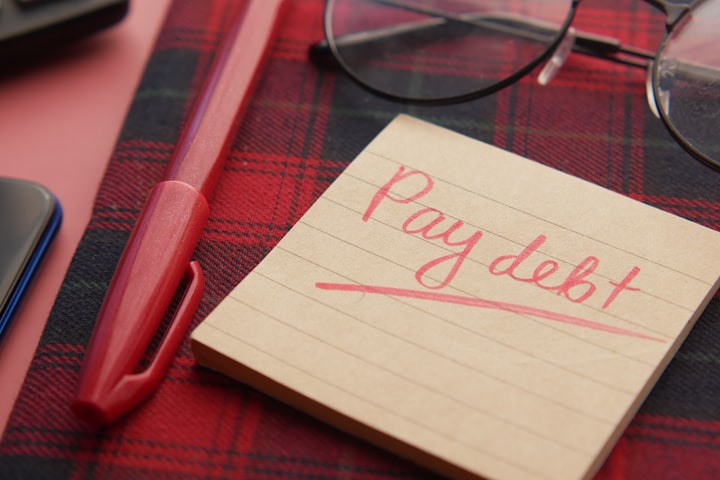How to Get Your Free Credit Score in 8 Simple Steps
Read this article to get free credit score

How to Get Your Free Credit Score in 8 Simple Steps
Having a good credit score is an important part of your financial health. That’s why it’s important to understand your credit score and stay on top of any changes. Thankfully, you can get your free credit score in 8 simple steps. In this blog post, we’ll walk you through the process of checking your credit score and provide tips on how to maintain and improve it. So let’s get started!
1) Check your credit report for errors
If you want to get a free credit score, the first step is to check your credit report for any errors or discrepancies. You can obtain a copy of your credit report for free from one of the three major credit reporting agencies – Experian, Equifax, and TransUnion. Checking your credit report can help you identify any mistakes or negative items that may be affecting your score.
When you receive your credit report, it’s important to review it carefully. Look for any discrepancies in account balances or reported activity, as well as any information that you don’t recognize or don’t remember. If you find an error, you should take steps to dispute it with the appropriate credit bureau. This process typically involves submitting a dispute letter and providing supporting documentation, such as copies of canceled checks or other proof of payment. If the credit bureau finds that the disputed item is inaccurate, they will remove it from your report and your credit score should improve.
2) Identify negative items on your credit report
Your credit report contains information about your financial activities, including any negative items that have been reported to the credit bureaus. To get an accurate picture of your credit standing, you should review your credit report carefully and identify any negative items that may be affecting your score.
Negative items on your credit report can include late payments, collections accounts, charge-offs, bankruptcies, judgments, liens, and other items. Some of these may be due to errors or fraud, while others may reflect poor money management or bad decisions in the past.
When reviewing your credit report, take note of the dates that each item was reported and review the details carefully. You’ll want to make sure that all the information is accurate and up to date. If there are any mistakes or discrepancies, you should file a dispute with the credit bureau to have them removed from your report.
You may also find that there are some negative items on your credit report that can’t be disputed or removed. These items may remain on your report for up to 7 years. In this case, it’s important to understand why these negative items occurred and work on improving your financial habits so that you can avoid similar issues in the future.
3) Dispute any errors you find
It is important to check your credit report for any errors. Mistakes can occur, such as incorrect late payments, incorrect balances, incorrect account statuses, and incorrect personal information. If you do find an error, it’s important to dispute it right away.
When you dispute an error, the credit bureau responsible for that error must investigate and either correct or delete it. To dispute an error, contact the credit bureau directly via mail, phone, or online. You should also include copies of any supporting documents that support your case. The credit bureau will then investigate the dispute and determine whether the item should be corrected or deleted from your report.
If the investigation results in a deletion or correction of the item in question, the credit bureau must inform the other two major bureaus of the change. It’s important to follow up with the credit bureaus to ensure that the disputed item is properly addressed. If your dispute is successful, you should see an improvement in your credit score over time .
#if you want to improve your credit score click here
4) Request a goodwill adjustment from your creditors
A goodwill adjustment is a request to your creditors to remove negative items from your credit report. It’s based on the fact that you’ve been a good customer in the past and that the negative items were either caused by an oversight or simply bad luck.
The first step in requesting a goodwill adjustment is to send a letter to your creditors explaining why you are requesting this change. In this letter, be sure to provide evidence of your past reliability and payment history. You should also include any mitigating factors such as job loss, medical issues, or other extenuating circumstances.
After you’ve sent your letter, you’ll have to wait to hear back from your creditor. If they approve your request, they’ll remove the negative item from your credit report. If not, you may have to try negotiating with them or consider other alternatives.
Requesting a goodwill adjustment can be a long process, but it’s worth it if it helps improve your credit score. It’s important to remember that even if your request is denied, the process itself won’t have a negative impact on your credit score. So don’t be afraid to ask.
5) Become an authorized user on someone else’s credit card
Becoming an authorized user on someone else’s credit card is a great way to get a free credit score boost. This method works best if the cardholder has a strong credit history and low balances.
To become an authorized user, you must first ask the cardholder to add you as one. This can be done either online or over the phone. Once the cardholder has added you, their name will appear on your credit report and their payment history and other information will be used to calculate your score.
The benefit of this method is that it won’t cost you anything and it won’t require any commitment from you. The downside is that it’s only a temporary fix and your credit score could drop again if the cardholder doesn’t make payments on time.
When considering this option, make sure that you understand the terms and conditions of the agreement, such as who is responsible for making payments and how long the arrangement will last. You should also make sure that the cardholder is someone you trust to make payments on time and in full. If not, their late payments could end up hurting your credit score.
By becoming an authorized user on someone else’s credit card, you can get a free credit score boost without spending any money or making any commitment. Just make sure to understand the terms and conditions of the arrangement and trust the cardholder to make payments on time.
6) Use a credit counseling or debt management service
If you’re overwhelmed with debt and don’t know where to turn, you may want to consider using a credit counseling or debt management service. These services can help you get your finances back on track by providing advice on budgeting, financial planning, and debt reduction strategies. They can also assist you in negotiating with creditors to lower your monthly payments and interest rates.
Credit counselors and debt management services are typically nonprofit organizations that provide free or low-cost services. When you contact one of these organizations, they’ll usually assign you a certified credit counselor who will evaluate your financial situation and help you create a customized plan for getting out of debt. The counselor may also be able to negotiate with your creditors to reduce or eliminate late fees and other penalties.
Be sure to research any credit counseling or debt management service you’re considering carefully. It’s important to make sure the organization is reputable and properly licensed. You should also be aware that some credit counselors may charge fees for their services.
7) Negotiate with your creditors
One way to improve your credit score is to negotiate with your creditors. This involves contacting your creditors and asking them to forgive some of your past debts. You can also ask for lower interest rates on current accounts or a payment plan that fits better within your budget. You may be surprised how accommodating your creditors can be if you explain the situation to them and provide proof of your financial hardship.
It’s important to remember that this is a negotiation. You have to be willing to give a little bit in order to get something out of it. Be sure to go in prepared with a plan, but don’t be afraid to ask for what you need. Make sure to ask for help if you need it, such as hiring a debt negotiator who can act on your behalf.
Negotiating with your creditors can be a daunting task, but it can pay off in the long run if done correctly. Having a good credit score is essential for anyone looking to take out loans or get better interest rates on credit cards and other forms of debt. If you’re willing to put in the effort, negotiating with your creditors can help you get back on track financially and improve your credit score.
8) Create a budget and stick to it
Creating a budget and sticking to it is the best way to ensure you are managing your finances responsibly. A budget helps you keep track of where your money is going, so you can make sure you are making the best decisions for your finances. It also lets you know when it’s time to save money, or make changes to help you stay on track.
Creating a budget is not difficult, but it does require commitment. You will need to decide what you are willing to spend each month, as well as how much you want to save. You can start by writing down all your income and expenses in order to get an accurate picture of your financial situation. Once you have that information, you can create a plan to make sure you are spending within your means.
Sticking to your budget can be challenging at times, but it is the best way to stay on track with your finances. You should review your budget regularly and make adjustments as needed. This will help you stay on top of any changes in your financial situation. Additionally, if there is something that you don’t need or don’t have room for in your budget, consider cutting it out. This will help ensure that you are staying within your means and keeping your debt under control.
Creating a budget and sticking to it is an important part of maintaining financial health. With the right strategy, you can ensure that your finances are under control and that you are making the best decisions for your future.





Comments
There are no comments for this story
Be the first to respond and start the conversation.